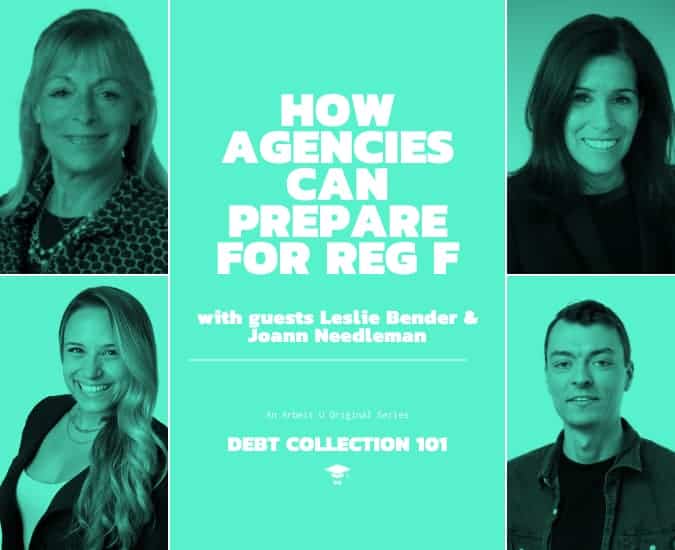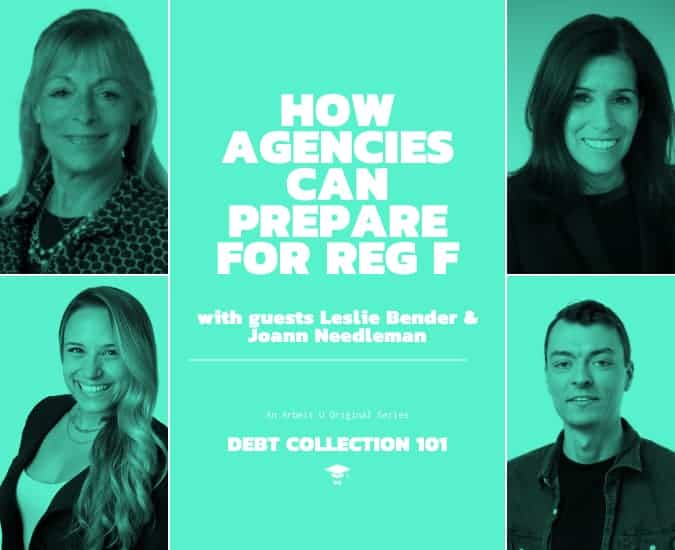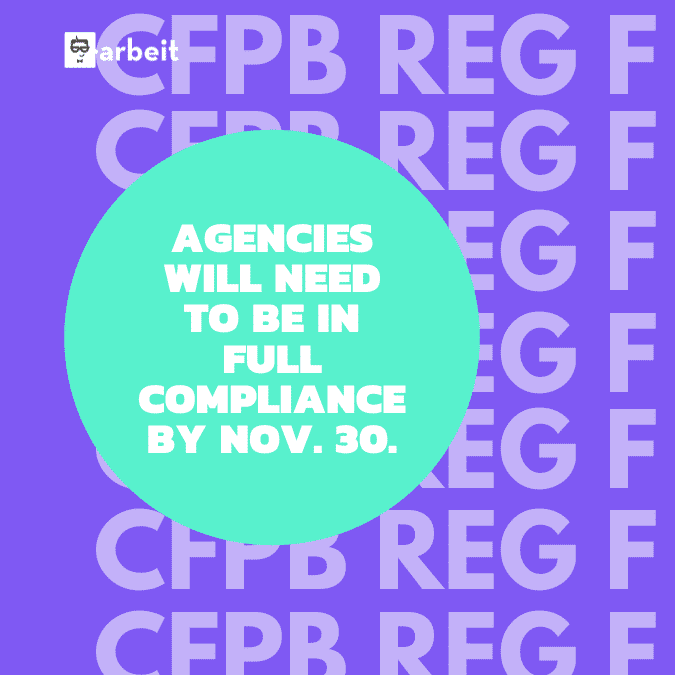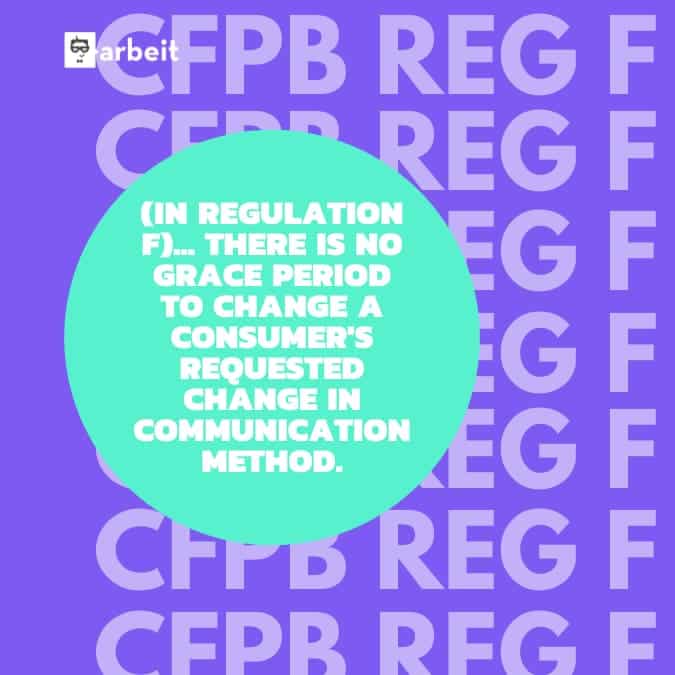How Agencies Can Prepare for the CFPB’s Debt Collection Rules

Start Making More Calls Today
Not sure which solution would be the best fit for your needs? We can work with you to find a solution that’s right for your business.
get a free quoteThe CFPB’s Debt Collection rules, or Regulation F, is the new ruleset implemented under the CFPB to add clarity and guidelines in consumer communication for collection agencies.
Agencies will need to make sure their current practices are compliant, which will prove tough if they do not know where to start. We are joined by Leslie Bender and Joann Needleman from Clark Hill Law who provide advice on the subject, and have built a 10 step Reg F Compliance Checklist to help agencies be compliant.
Watch our converation with Joann and Leslie, or use the timestamps below to navigate to your topic of choice!
REG F IMPLEMENTATION DATE [3:10]
Due to consumer advocacy group efforts, there was a chance that the FDCPA might make additional adjustments to Reg F before it became active in the industry or push the start date back.
However, the FDCPA has decided that they will not be making any additional changes to Regulation F or adjusting the implementation date for the law.
With this, agencies will need to be compliant with the new regulations on November 30th, as there will be no grace period for the regulatory commission to take legal action for noncompliance.

URGENCY IN PLANNING [4:00]
Leslie brings up the question a client asked her regarding what-ifs on compliance, for example, post dated direct mail sent before or on November 30th. Joann provides further insight explaining that in letters it will be more clear cut if you are being compliant or not based on the new information that is required when contacting clients.
However, Joann says, “If you’re not thinking about it (Reg F preparation) now, you’re a little late, then you need to start dealing with your vendors and clients immediately.”
She explains that collection agencies, especially larger ones, might find small hurdles in their logistical chain in implementing changes, such as working with third party lenders and other departments within the business, so working proactively towards compliance is recommended.

SUGGESTIONS FOR AGENCIES THAT HAVE NOT PREPARED YET [14:43]
Alex asks Joann what steps should an agency take at this point if they have not made any efforts to be compliant with Regulation F CFPB yet. Joann and Leslie thankfully came prepared with a Reg F Compliance Checklist with 10 steps to ensure an agency is compliant by November 30th.
1. Talk with Your Highest Governing Body of Your Organization [15:45]
Schedule and hold a meeting with your highest governing body along with any professional advisors to make key determinations with regard to rule requirements. Retain minutes of your discussions and the results. Setting the groundwork and creating a plan for going from point A – B in compliance.
2. Speak with Your Technology Vendors [16:28]
Engage in a detailed conversation with all your collections system and technology vendors to ensure that:
- Your systems will support and capture consumers’ communication preferences
- Your application programming interfaces (APIs) are able to link to any self-service portal or web-based resources, and,
- Any “apps” you offer to consumers are enabled in order to express or change communication preferences.
3. Update Consumer Information [17:00]
Reach out to existing consumers to update contact information as well as any new, changed, or revoked permissions or preferences.
4. Decisions about the Model Validation Notice [17:46]
Determine whether your company will migrate to the Reg F model validation notice. To ensure the notice will be compliant on or before the implementation date, you need to talk with your clients to determine that all necessary data elements can be transmitted timely and there is a determination as to which of the five mandated “itemization dates” will be used. If your company decides to continue to use a proprietary validation notice, review Reg F, specifically Section 1006.34 to assure your collection notice templates meet all mandated requirements.
5. Will you use the “Limited Content Message?” [17:52]
If your company decides to adopt the “limited content message”, you will need to test your collection agency’s name to assure that any message left, using that name, will be compliant and not reveal that the call is from a collection agency
6. Review Credit Reporting Policies [18:00]
Review your policies related to the furnishing of data to the consumer reporting agencies. If you do furnish data check that your system logic assures that after November 30, 2021, you will not be furnishing data on any accounts that have not received your initial collection notice.
7. Staff Training and Assessments [18:05]
Review and update your talking points, training programs, voice analytics, and other ways in which you train collectors who engage and interact with customers to assure that they are familiar with:
- How to handle and capture expressions of a consumer’s communication preferences
- How to offer consumers optional communications strategies
- How to listen for changes or revocations of communication preferences,
- How to field questions about your Reg F compliant collection notice
8. Review Document Retention Program [19:17]
Tune up your document retention programs to assure that any and all artifacts and resources you have that can prove your compliance (or non-compliance) can be retained consistent with Reg F’s retention expectations. This includes including call recordings.
9. Are you Compliant with Call Frequency Requirements and Alternative Methods of Communication? [19:23]
Ensure that you have the capability to monitor 7 call attempts within a 7-day period and then one call within a week after having a telephone conversation with a consumer. If you are using or intend to use electronic methods of communication like email or text, make sure that opt-outs and unsubscribes are working in real time and that there are no delays in complying with a consumer’s desire not to be contacted by one or both of those methods.
10. Meet with your Clients [10:41]
Schedule time to meet with your clients to assure they are aware of the high points of Reg F and how it may change the exchange of information about debts and consumers’ demographics and communications preferences.
Consider a debrief presentation to demonstrate how your company is adapting and planning for these Reg F changes.
IDEAL COMMUNICATION STANDARD OF REG F [20:30]
Leslie then dives into the purpose of the new regulation measures, explaining, “What the CFPB is trying to do in its interpretation of the FDCPA is to set rules of the road that harmonize these 1977 guardrails with how we communicate today. They want to ensure that they have set the stage to ensure that collection agencies will be collecting the:
- Correct amount
- From the right consumer
- Per the consumer’s preferred communication method.”
Leslie elaborates that if you can portray this significance of the three steps Regulation F requires to your collection agents when training then you will be setting the groundwork for your agents to be compliant in their communication efforts.
URGENCY OF CHANGING PREFERRED COMMUNICATION METHOD [21:50]

Leslie states that consumer advocate groups historically throughout her career have pushed for strict legislation to protect consumers, and have been proactive in informing consumers of their rights.
She says, “(In Regulation F)… there is no grace period to change a consumer’s requested change in communication method.” She further elaborates that if a communication change request is made and is not honored due to support processing time, that can technically be applicable as a violation.
It is essential that changed communication requests are prioritized and accommodated immediately to avoid noncompliance.
HOW SOFTWARE WILL HELP [24:00]
Although it seems that this would be entirely dependent on the agency to be on top of, Alex argues that the choice of software will be the main bottleneck to efficiently implementing these requests.
Most collection agencies use a handful of different programs usually from different companies, which can add a lag as most of these softwares do not automatically integrate updated information.
Alex explains that none of this really is hard to do on the agencies side, but really is on the software vendors to finally integrate their products with others to allow agencies to be compliant.
POTENTIAL CHANGES THAT COULD BE MADE TO REG F [25:06]
Looking forward past November 30th, after Regulation F FDCPA is implemented, Alex asks the question whether or not there may be changes to the regulation later, or if agencies can feel secured in the wording for at least the near future.
Joann explains that historically any changes made to large legislation like this should be viewed as a positive, as it can further elaborate on confusion that agencies may find themselves in.
Any cross-issues between different areas in the regulation that might need to be fixed should be welcomed. However, any additional new regulation after the point of implementation would likely come in the form of a different regulation measure.
She encourages communication between agencies and others in the industry to provide feedback to the bureau so if there is any overlap, those can be addressed.

DUE DILIGENCE DONE IN CREATING REG F [28:00]
Leslie furthers this point by stating that the CFPB understands that making changes in regulation does cost agencies and software vendors money and time, and would like to avoid having to largely amend the current regulation or implement new regulations.
This is portrayed in the amount of time it has taken for Regulation F to be implemented, and the amount of resources they personally have spent looking into the market to ensure the regulation is up to par with what the industry needs.
Leslie knocks this out of the park with the metaphor, “You can’t untether from the shore if you have no destination, and you have to be prepared for things you may find on the journey,” referring to not only the CFPB, but the entire industry in their preparation for Reg F.
About Our Speakers
Joann Needleman
PRACTICE LEADER AT CLARK HILL LAW
Joann is the Practice Leader of the Consumer Financial Services Regulatory & Compliance Group at Clark Hill Law. She has worked in the financial regulation industry for many years, previously serving as President of the National Creditor Bar Association.
Email: jneedleman@clarkhill.com
Leslie Bender
SENIOR COUNSEL AT CLARK HILL LAW
Leslie Bender has been in the collection and credit regulation industry for over 38 years, serving as a certified instructor for the Association of Credit and Collection Professionals for over 24 years. Aside from these current roles, Leslie also has served as senior leadership for many other companies in the industry throughout her career.
Email: lbender@clarkhill.com
This information does not, and is not intended to, constitute legal advice; instead, all information is for general informational purposes only.
About The Author
Alex Villafranca
Alex is the CEO, co-founder and Head of Revenue at Arbeit, a better outbound communication software that makes businesses more profitable.

